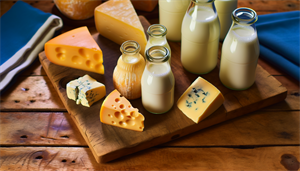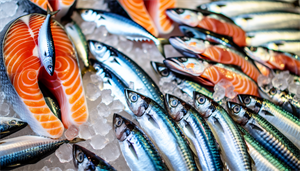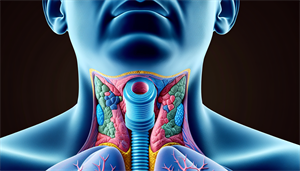Have you ever thought about the connection between your diet and your sleep? It’s not something we often consider, but what we eat can significantly impact our sleep quality - especially for those of us dealing with sleep apnea.
While changing your diet won’t cure sleep apnea, knowing what foods cause sleep apnea can significantly affect the severity and frequency of symptoms, making it a crucial part of managing the condition.
Key Takeaways
-
Foods high in saturated fats, like fatty meats and high-fat dairy products, as well as sugary and processed foods, can worsen sleep apnea symptoms due to their contribution to inflammation and obesity.
-
Alcohol, caffeine, and other inflammatory foods have a detrimental effect on sleep quality and may exacerbate sleep apnea symptoms by inducing throat muscle relaxation and disrupting sleep patterns.
-
A combined approach of a healthy diet rich in melatonin, omega-3, and tryptophan, alongside regular exercise and medical interventions like CPAP therapy, can effectively manage and improve sleep apnea symptoms.
Foods that Trigger Sleep Apnea

It’s not widely known that certain foods can trigger sleep apnea symptoms. Consuming fatty meats, high-fat dairy products, and sugary processed foods can worsen the symptoms of this sleep disorder, impacting your sleep quality. So, if you’re struggling with sleep apnea, it might be time to reconsider your food choices. You may significantly improve your sleep quality by steering clear of these problematic foods.
Of course, it’s not just about what you shouldn’t eat. It’s also about understanding why these foods can be problematic and finding healthy, tasty alternatives. We will delve into these dietary culprits, highlighting why they are troublesome for sleep apnea sufferers.
Fatty Meats
While fatty meats might be tempting, they are not the most suitable choice for those battling sleep apnea. These high saturated fat foods can lead to increased inflammation and contribute to cardiovascular issues, which have been associated with an increased risk of sleep apnea. Some examples of fatty meats to avoid include:
-
Burgers
-
Steaks
-
Pork
-
Bacon
-
Sausages
Consuming fatty meats, which are considered as fatty foods, can elevate cholesterol levels and increase the risk of heart disease.
What’s the alternative? A Mediterranean diet, which is low in red meat and high in fruits, vegetables, and healthy fats, may be a better option for individuals with sleep apnea. This heart-healthy diet can help you manage your weight, reduce inflammation, and improve your overall health - all of which can help manage sleep apnea symptoms.
High-Fat Dairy Products

High-fat dairy products, another trigger for sleep apnea, can potentially increase mucus production, making it more difficult to breathe during sleep.
If you’ve ever experienced a sore or itchy throat, persistent urge to cough, or increased drainage, it could be a sign of increased mucus production due to high-fat dairy consumption. To manage your symptoms, consider switching to low-fat dairy options or plant-based alternatives.
Sugary and Processed Foods
Furthermore, sugary and processed foods can induce inflammation in the body, possibly worsening sleep apnea symptoms. High-glycemic foods, characterized by high levels of processed sugars, can lead to rapid increases in blood glucose levels, contributing to obesity - a known risk factor for sleep apnea. Some examples of high-glycemic foods to avoid include:
-
Soda
-
Candy
-
Pastries
-
White bread
-
White rice
By reducing your intake of these foods, you may be able to lose weight, improve your sleep apnea symptoms, and overall health.
Avoiding these inflammatory foods, such as processed, fried, and sugary foods, can help manage your symptoms and prevent unwanted weight gain. Instead, try choosing whole grains over enriched grains. These foods have a lower glycemic index, helping prevent blood sugar spikes that can contribute to obesity and reduce the risk of sleep apnea.
Foods to Avoid for Better Sleep
Having discussed the foods that trigger sleep apnea, we now turn our attention to foods and beverages that should be avoided to enhance sleep quality. Eliminating or cutting back on alcohol, caffeine, and inflammatory foods can amplify your sleep quality and mitigate your sleep apnea symptoms.
Some beverages that can disrupt your sleep patterns include:
-
Alcohol, which may give you the initial feeling of relaxation but can significantly disrupt your sleep patterns
-
Caffeinated beverages, which can impair your ability to fall asleep and maintain sleep
-
Sugary beverages like soda, which can contribute to weight gain and exacerbate sleep apnea symptoms.
Alcohol

Though a glass of wine or a cocktail may seem soothing before bed, they may actually worsen sleep apnea symptoms. This is because alcohol induces relaxation in the soft tissues of the upper airway, potentially worsening existing obstructions, and reduces the drive to breathe during sleep.
This immediate influence on sleep apnea symptoms can cause muscle relaxation in the upper throat, leading to their collapse and exacerbating symptoms. That’s why it’s recommended to abstain from alcohol before bedtime to reduce its impact on sleep apnea.
Not to mention, consuming alcohol can decrease the time spent in the REM stage of sleep, which is crucial for restorative sleep, potentially leading to a decline in overall sleep quality.
Caffeine and Soda
Much like alcohol, caffeine and soda can also disrupt your sleep. These culprits can impede your ability to initiate and maintain sleep, exacerbating sleep apnea symptoms.
Regular soda consumption is particularly problematic. These drinks are often high in calories and lack nutritional value, contributing to weight gain - a known risk factor for sleep apnea. The caffeine in these drinks can also substantially disrupt your sleep patterns, leading to challenges in falling asleep, delayed initiation of sleep, and interference with overall sleep quality.
Inflammatory Foods
Our diet can often be a source of inflammation, particularly if it’s rich in processed foods, fried items, and added sugars. These foods can exacerbate sleep apnea symptoms by elevating inflammation and the risk of cardiovascular disease.
To combat this, consider incorporating anti-inflammatory foods into your diet. Here are some examples:
-
Increasing your intake of fruits and vegetables
-
Selecting lean protein sources like tofu and tempeh
-
Consuming nuts and seeds
-
Incorporating healthy fats such as olive oil
-
Consuming fresh fish rich in omega-3 fatty acids
-
Choosing antioxidant-rich foods like blueberries and citrus fruits
These foods can all help reduce inflammation and improve sleep quality.
Beneficial Foods for Sleep Apnea Management
Knowing what foods to avoid is important, but knowing which foods can help manage sleep apnea symptoms is equally crucial. Certain foods, including those rich in melatonin, omega-3, and tryptophan, can assist in managing sleep apnea.
These foods not only help regulate our sleep-wake cycle but also decrease inflammation and reduce the risk of cardiovascular disease. Incorporating them into your diet can lead to improved sleep quality and a reduction in sleep apnea symptoms.
Melatonin-Rich Foods
Melatonin is the hormone that signals to our bodies that it’s time to sleep. Consuming foods rich in melatonin, such as cherries, nuts, and eggs, can assist in regulating this sleep-wake cycle, helping to improve sleep quality and manage sleep apnea symptoms.
Incorporating these foods into your diet can help regulate your sleep-wake cycle, making it easier to fall asleep and stay asleep. It’s an easy and natural way to enhance your sleep quality and reduce the severity of your sleep apnea symptoms.
Omega-3 Rich Foods

Another beneficial nutrient for sleep apnea sufferers is omega-3. Foods rich in this nutrient, such as:
-
salmon
-
sardines
-
mackerel
-
trout
-
chia seeds
-
flaxseeds
Including melatonin production, reduced inflammation, and lower blood pressure, these factors contribute to a decreased risk of cardiovascular disease.
By incorporating more omega-3 rich foods into your diet, you can enhance your body’s natural sleep-wake cycle and reduce inflammation. This can help manage your sleep apnea symptoms and improve your overall health.
Tryptophan-Rich Foods
Tryptophan is an essential amino acid that plays a crucial role in the production of serotonin and melatonin - neurotransmitters that regulate our mood and sleep. Foods rich in tryptophan, such as:
-
turkey
-
chicken
-
fish
-
beans
-
nuts
-
vegetables
Incorporating dental sleep medicine as a natural sleep enhancer can therefore enhance our sleep quality, ensuring a good night’s rest and alleviating sleep apnea symptoms.
Incorporating these foods into your diet can promote better sleep, making it easier to manage your sleep apnea symptoms. Just remember to consume them in moderation, as excessive consumption can lead to potential side effects such as:
-
headaches
-
blurry vision
-
drowsiness
-
stomach pain
-
diarrhea
-
vomiting
The Role of Diet and Exercise in Sleep Apnea Management
Though diet is a key factor in managing sleep apnea, it’s not the only solution. Regular exercise is an equally, if not more, vital component for managing this condition.
Exercise can help reduce the severity of sleep apnea symptoms, improve your overall health, and enhance your quality of life. Together, a healthy diet and regular exercise can make a significant difference in managing sleep apnea.
Weight Loss and Sleep Apnea
One standout benefit of a healthy diet coupled with regular exercise is weight loss, which can considerably alleviate the severity of obstructive sleep apnea. Obesity is closely associated with sleep apnea, as excess body weight can put additional pressure on the upper airways, leading to their collapse and reduced neuromuscular function.
Even modest weight loss can bring about substantial improvements in sleep apnea symptoms. In fact, a reduction of 10-15% in body weight can halve the severity of sleep apnea in moderately obese individuals. Alongside weight loss, lifestyle and diet modifications can also alleviate sleep apnea symptoms, making them an essential part of treatment.
Exercise and Sleep Quality
Exercise isn’t just good for weight loss - it can also directly improve sleep quality. Regular exercise can alleviate sleep apnea symptoms by preventing fluid from accumulating in the neck and constricting the airway at night. Additionally, specific throat and tongue exercises can strengthen the muscles, helping to alleviate sleep apnea symptoms.
Exercise also promotes vascular health, which is particularly beneficial for individuals with sleep apnea as it enhances overall cardiovascular functioning. The recommended exercises for sleep apnea sufferers include:
-
Tongue stretches
-
Tongue slides
-
Tongue push-ups
-
Tongue wags
-
Spoon hold
-
Jaw stretches
-
Yogic breathing
Incorporating these into your routine can lead to significant improvements in your sleep apnea symptoms.
Sleep Apnea Treatment Options Beyond Diet
Despite the importance of diet and exercise, it’s worth noting that they are merely components of a comprehensive sleep apnea therapy plan. Other treatment options, like Continuous Positive Airway Pressure (CPAP) therapy, oral appliances, and lifestyle changes, can also be highly effective for managing sleep apnea.
Each of these treatment options has its own benefits and potential drawbacks, so it’s important to discuss them with your healthcare provider to determine the best approach for you. Remember, the most effective treatment for sleep apnea is often a combination of diet, exercise, and medical intervention.
Summary
In conclusion, diet and exercise play an integral role in managing sleep apnea. By understanding which foods can trigger symptoms, which foods can help manage them, and the benefits of regular exercise, you can take proactive steps towards improving your sleep quality and overall health. Remember, though, that managing sleep apnea often requires a multifaceted approach that includes diet, exercise, and medical intervention. It’s about finding the right balance for your body and your lifestyle. So here’s to better sleep and healthier living - you’ve got this!
Frequently Asked Questions
What foods should be avoided with sleep apnea?
Avoid foods that can cause acid reflux, such as spicy and fatty foods. They can worsen sleep apnea symptoms by causing inflammation and narrowing of the airways.
What is the root cause of sleep apnea?
The root cause of sleep apnea can be either problems in the brain's communication with the breathing muscles (central sleep apnea) or relaxed throat and tongue muscles blocking the airway during sleep (obstructive sleep apnea).
What aggravates sleep apnea?
Sleeping on your back can worsen sleep apnea by causing the tongue and soft palate to fall back, leading to increased breathing difficulties. Sleeping on your side may help reduce episodes of apnea.
What drinks help sleep apnea?
Drinking a warm glass of caffeine-free herbal tea before bed can have soothing, calming effects and can become a pleasurable part of your sleep routine. It can help manage the symptoms of sleep apnea.
Will sleep apnea go away if I lose weight?
Losing weight can significantly reduce the severity of sleep apnea, but it may not cure the condition entirely, and additional therapies may be needed for many patients.


